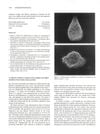27 citations,
January 2015 in “International Journal of Trichology” The supplement helps improve hair growth and reduce hair shedding.
23 citations,
January 2016 in “International Journal of Trichology” Women with female pattern hair loss have lower Vitamin D3 levels.
 22 citations,
June 2012 in “PLOS ONE”
22 citations,
June 2012 in “PLOS ONE” Cholesterol-related compounds can stop hair growth and cause inflammation in a type of scarring hair loss.
 21 citations,
August 2011 in “Body Image”
21 citations,
August 2011 in “Body Image” Acceptance reduces hair loss distress and medical consultations; coping mechanisms increase them.
12 citations,
January 2020 in “Indian Dermatology Online Journal” Female pattern hair loss has multiple causes and treatments, with new therapies showing promise.
 8 citations,
September 1993 in “British journal of dermatology/British journal of dermatology, Supplement”
8 citations,
September 1993 in “British journal of dermatology/British journal of dermatology, Supplement” A new method helps isolate key hair components to study hair growth and loss.
 6 citations,
June 2018 in “Journal of pediatric endocrinology & metabolism/Journal of pediatric endocrinology and metabolism”
6 citations,
June 2018 in “Journal of pediatric endocrinology & metabolism/Journal of pediatric endocrinology and metabolism” Patients with the same genetic mutation for vitamin D-resistant rickets showed different symptoms but all improved with treatment except for hair loss.
 5 citations,
January 2021 in “Skin appendage disorders”
5 citations,
January 2021 in “Skin appendage disorders” Smoking is linked to more hair loss and premature graying compared to nonsmokers.
 3 citations,
November 2019 in “Journal of Investigative Dermatology”
3 citations,
November 2019 in “Journal of Investigative Dermatology” Adenosine helps human hair grow and prevents hair loss by targeting specific cells.
 3 citations,
May 2018 in “InTech eBooks”
3 citations,
May 2018 in “InTech eBooks” Animal models, especially mice, are essential for advancing hair loss research and treatment.
 3 citations,
May 2018 in “Journal of nutritional health & food science”
3 citations,
May 2018 in “Journal of nutritional health & food science” Nutritional supplements can help manage hair loss and promote hair growth by strengthening hair roots and countering harmful effects of pollution, smoking, and deficiencies in vitamins and minerals.
 2 citations,
March 2021 in “Dermatologic Therapy”
2 citations,
March 2021 in “Dermatologic Therapy” Low-level laser therapy helps increase hair growth in female pattern hair loss but not in telogen effluvium.
 2 citations,
January 2019 in “International Journal of Case Reports and Images”
2 citations,
January 2019 in “International Journal of Case Reports and Images” The hair growth solution reduced hair loss and increased hair thickness in a small group of patients.
 1 citations,
January 2023 in “Nutrients”
1 citations,
January 2023 in “Nutrients” Drinking lots of sugary drinks may increase the risk of hair loss in young men.
 1 citations,
October 2022 in “Cureus”
1 citations,
October 2022 in “Cureus” Over half of the participants in a Saudi Arabian survey experienced hair loss after COVID-19, affecting women and younger people more, with a small percentage feeling a severe impact on their lives.
1 citations,
January 2021 in “Menoufia Medical Journal” Alopecia areata may be linked to heart issues.
1 citations,
January 2019 in “Journal of the Egyptian Women's Dermatologic Society (Print)” Minoxidil 2% is more effective for female hair loss, but botanicals have fewer side effects.
 1 citations,
October 2016 in “Iranian journal of psychiatry and behavioral sciences”
1 citations,
October 2016 in “Iranian journal of psychiatry and behavioral sciences” Sertraline, an antidepressant, may rarely cause hair loss.
 1 citations,
May 2014 in “Hair transplant forum international”
1 citations,
May 2014 in “Hair transplant forum international” Rogaine can stop hair loss in women, and other treatments like certain pills, light therapy, and special shampoos may also work.
 1 citations,
August 1994 in “Journal of Cutaneous Pathology”
1 citations,
August 1994 in “Journal of Cutaneous Pathology” Hair loss happens due to faster cell growth and fewer cells in affected follicles.

Maintaining enough zinc may help prevent and manage hair loss.
 July 2024 in “Skin Appendage Disorders”
July 2024 in “Skin Appendage Disorders” Certain medications, including some immune drugs, contraceptives, and hair loss treatments, are often linked to hair loss.
 January 2024 in “Aging medicine”
January 2024 in “Aging medicine” A COVID-19 infected patient with chronic kidney disease experienced worsened kidney function, hair loss, and unexpected wart clearance.
 November 2023 in “Cureus”
November 2023 in “Cureus” Most people in Jazan know about vitamin D, zinc, and ferritin's link to hair loss but don't practice enough preventive measures.
 October 2023 in “Journal of Preventive Diagnostic and Treatment Strategies in Medicine”
October 2023 in “Journal of Preventive Diagnostic and Treatment Strategies in Medicine” Low ferritin and Vitamin D levels may cause hair loss after COVID-19.
 June 2023 in “Skin Research and Technology”
June 2023 in “Skin Research and Technology” The supplement with amino acids, iron, selenium, and marine hydrolyzed collagen improved hair growth more than drug treatment alone, with most people tolerating it well.
 May 2023 in “Journal of Clinical Medicine”
May 2023 in “Journal of Clinical Medicine” New understanding and treatments for hair loss are improving, but more research is needed.
 May 2022 in “Journal of the Egyptian Women's Dermatologic Society (Print)”
May 2022 in “Journal of the Egyptian Women's Dermatologic Society (Print)” Women's hair loss can be due to hormonal changes and various conditions, with treatments focusing on stopping progression and managing symptoms.
 October 2021 in “Research Square (Research Square)”
October 2021 in “Research Square (Research Square)” Hair follicle stem cells in hairpoor mice are disrupted, causing hair loss.

Hair loss after weight loss surgery can improve over time.
























